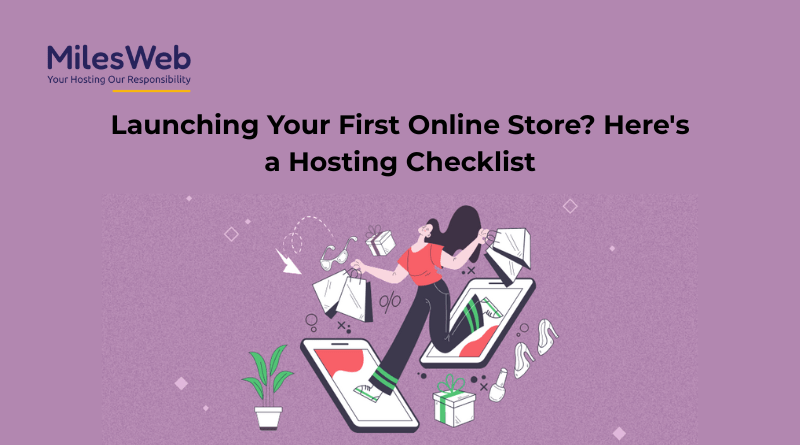
Starting the online store is a good journey, but before opening the digital doors to customers. Choosing the right web hosting service with AI website maker can break or break your eCommerce experience. The perfect hosting ensures speed, security, scalability, and a hassle-free user experience. One wrong option can lead to downtime, poor loading times, and loss in sales. Whether you are using WooCommerce, Shopify, Magento, or a custom platform, the web hosting infrastructure directly impacts an online store’s performance.
To ensure you’re on the right track, we mentioned a simple hosting checklist for you. These key points will assist you in choosing the best hosting plan for eCommerce website. Uptime guarantees the ability to scale servers and everything in between will factor into your success. Let’s dive in:
Checklist for Your First Online Store
1. Uptime Guarantee is a Must
Your online store must be accessible. If it is inaccessible, you can’t sell products and services. Uptime is basically a reference to how reliably the website stays online. A reliable web hosting provider, MilesWeb, offers 99.9% guaranteed uptime, ensuring the website is available to all potential buyers.
Even an hour of downtime during peak shopping times can result in lost revenue and lost trust. Choose a hosting partner who has a proven record of uptime SLA (service level agreement) backed by real monitoring and real support.
2. Speed & Performance Optimization
Online buyers are impatient and have a shorter attention span. A delay of even milliseconds in the page loading causes cart abandonment. The web hosting provider delivers top-notch performance, ideally with SSD NVMe storage, advanced caching technologies, and CDN integration.
The quicker your website loads, the more likely your visitors are to convert. Google also factors site speed into its ranking, so it has implications for SEO as well as SEO. Always ask the host about their server response times and performance benchmarks before you choose a host.
3. Security & SSL Certificate
Website security is a non-negotiable factor for an eCommerce website. Web hosts must offer a secure environment with robust features like malware protection, firewalls, DDoS mitigation, and regular security patches.
Also, if your site is not using SSL (HTTPS) for secure transactions, you are probably missing out on SEO ranking benefits as well. Many good hosts offer free SSL certificates; make sure yours does.
4. eCommerce-Friendly Features
Not all web hosting services are customized for online stores. Consider eCommerce-ready hosting features like one-click installs for WooCommerce or Magento-like platforms. Also, their plans must include PCI compliance and offer easy integration with online payment gateways.
Some hosts even offer specialized eCommerce plans that come pre-optimized for store functionality. These save time and prevent technical hiccups during setup and scaling.
5. Scalability & Resource Flexibility
You may start your store on a modest scale. However, as the store grows, you will need to be ready to handle increased traffic, greater transactions, and other operational demands. Your hosting solution must be scalable, enabling you to increase resources seamlessly without the need to migrate your entire website.
Flexibility in scaling your website resources includes moving from shared to VPS hosting and increasing other resources such as bandwidth, storage, and others. Look for providers that guarantee upgrades with limited downtime as well as clear paths for scaling equipment.
6. 24/7 Support & Technical Assistance
Having a breakdown with a piece of equipment ought to be the least of your concerns. Even the strongest setup still faces issues. Having responsive, knowledgeable customer support can make it easier for you to manage an online store, considering every second is crucial.
Being in the online business requires you to choose a hosting company that provides 24/7 live chat, ticket support, and phone access. Before you commit, look for equipment responsiveness review tests. It will save you from countless headaches in the future.
Conclusion
A major milestone is opening your first online store. From having a dependable host who guarantees uptime and security to scalability and growth, the host you pick for your online store can shape your entire eCommerce journey. With numerous hosting options available, you might find yourself bewildered with choices, but using this checklist will allow you to zone in on what will benefit your business the most.
To put it simply, your website is akin to a store. Just as a physical store requires an area with light foot traffic, your online store requires solid, fast, and secure hosting. Smart decisions regarding support and performance give businesses the guarantee that they will effortlessly watch their business grow online.
